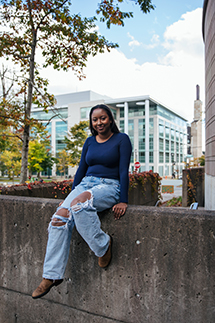This article is part of a series focusing on fall grads of the ±«Óătv Class of 2024. Visit the Convocation website for more information and to access live webcastsĚýof the ceremonies.
When Tyeshia Angel Jordan first moved to Halifax from her hometown of Truro, she planned on pursuing a degree in biology — a field she’d long been interested in. That was before she became “absolutely mesmerized” by a gender studies course during her first semester.
“It wasn’t a huge surprise to my close friends that I switched to the arts,” says Angel, who always had a love for subjects like English, history, and sociology.
This fall, Angel — as she’s known to friends and family — graduates from the Faculty of Arts and Social Sciences (FASS) with a Bachelor of Arts with major in Gender and Women’s Studies and minor in Black and African Diaspora Studies.
 She hadn’t really considered Gender Studies before that life-changing course but by the end of her second year she was finding that biology wasn’t for her. That was around the same time George Floyd’s murder took place, putting an emphasis on the importance of social justice and understanding systemic violence and inequality for Angel.
She hadn’t really considered Gender Studies before that life-changing course but by the end of her second year she was finding that biology wasn’t for her. That was around the same time George Floyd’s murder took place, putting an emphasis on the importance of social justice and understanding systemic violence and inequality for Angel.
“Gender and Women’s Studies, along with Black and African Diaspora Studies, felt like a natural transition for me at the time,” says Angel. “As a Black person with roots in Nova Scotia, I have always been interested in the Black Canadian experience and the experiences of the Black diaspora as a whole in terms of philosophy, history, culture and identity.
“In school, we only scratched the surface. Most of what I learned regarding Black Nova Scotian history actually came from listening to my mother, grandparents and other elders. Gender studies was a bit more unexpected but, as a Black woman, I also felt like I wanted to understand how race and gender interact and intersect with one another and how we understand the world through a gendered lens.”
Pathways in research
Angel’s move to FASS also introduced her to paid research opportunities, including the Social Sciences and Humanities Research CouncilĚý, the first time that the award has been offered for social sciences and humanities work. This allowed her to work as a research assistant for ±«Óătv Social Anthropology Associate Professor Dr. Martha Radice, analyzing her field work research from New Orleans, an experience Angel describes as “extraordinary.”
“It was my first experience doing research-related work, and Dr. Radice really took the time to teach me everything from scratch,” says Angel, noting her interest in Black culture and Mardi Gras in New Orleans, a place her mother had always dreamed of visiting. “I think Black people everywhere see New Orleans as a Mecca or a centre of Black culture and it’s just so unique and beautiful.”
Angel also notes that Dr. Radice gave her a lot of creative freedom to dive into Black cultural practices in New Orleans both within and outside of carnival. She was able to research and write about different carnival krewes — social clubs that organize carnival activities — and the socioeconomic impacts from Hurricane Katrina on Black communities.
“Black communities were probably hit the hardest and neglected the most during the hurricane and many have been unable to return to New Orleans because of things like gentrification and the changing economy,” Angel explains. “I also got to explore creole identity and culture which I found fascinating. As a Black and African Diaspora student, I find it interesting to consider how race and blackness shift depending on place and time. Race is socially constructed and the meaning of blackness shifts depending on where you go and what time period you’re in. Creole identity is a great example of that.”
Equipped for the future
The experience also helped Angel gain two research assistant jobs that helped support herself through the 2023/24 academic year. She worked for Dr. OmiSoore Dryden, the James R. Johnson Chair in Black Canadian Studies at Dal, focusing on the experiences and disparities faced by Black populations when accessing health care, and with Dr. Ilana Dodi Luther at the Access to Justice and Law Reform Institute on recommendations for provincial child welfare reform.
Working with Dr. Luther inspired Angel to set her sights on attending law school at ±«Óătv. She is currently studying for the LSAT and working for the Halifax Public Libraries, with future career goals to involve helping African Nova Scotians, justice-involved mothers and other under-privileged groups navigate the justice system.

“I would love to be involved in policy change in the future and maybe even forensic social work,” she adds.
Angel says her experiences as a student and researcher at ±«Óătv have earned her valuable skills in time management strategies and research that have set her up well for her future.
“I feel much more equipped to take the skills I’ve learned in class regarding things like equity, systemic racism and gender inequality into the workplace because I’ve also worked with those concepts in research and I’ve gotten a better idea of how they operate in people’s lives,” she says. “Seeing the impacts of gender and race in research makes them feel more tangible and less like abstract concepts.”

